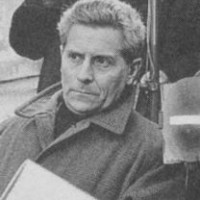Franju was a French director, also famous as one of the founders of the French Cinematheque (with Henri Langlois in 1936). In 1938, he became the executive secretary of the
FIAF - Fédération Internationale des Archives du Film (International Association of Film Archives) founded at the initiative of the French Archive. Franju met Langlois through his twin brother Jacques, and the two film lovers soon founded the
Cercle du cinéma, an organization that showed films and organized film discussions. They got the idea to establish a film archive from their friend, film theoretician and director Germaine Dulac who helped them with the organizational aspect of the project. In 1937, Franju and Langlois started the film magazine
Cinematographe, but managed to publish only two issues. He began his directing career with short films and in 1934, made his feature debut
Le metro. His next film,
Le sang des bêtes (1949), a documentary about a slaughterhouse shot in 16mm, received recognition. His next two films,
En passant par la Lorraine (1950) and the documentary about a veterans’ hospital
Hôtel des Invalides (1952), were commissions from the government but he added his unique author signature and a subtle critique to them. The documentary was his own personal favorite and he unofficially called it the last part in the trilogy about “slaughterhouses”. He directed Georges Méliès’ (
Le grand Méliès, 1952) and the famous chemist Marie Curie’s (
Monsieur et Madame Curie, 1956) autobiographies. He introduced dramatic sequences in his films
Mon chien (1955) and
La première nuit (1958), which was his thirteenth and last short film (in 1954 he made
Navigation marchande atlantique but refused to be credited for it). From 1958 to 1973, he directed many feature films; the debut
La tête contre les murs (1959), horror
Eyes Without a Face (Les Yeux sans visage, 1959), thriller
Pleins feux sur l'assassin (1961), drama
Thérèse Desqueyroux (1962),
Judex (1963), in honor of the silent film series under the same title directed by Louis Feuillade from 1916. In the1960s he made the war drama
Thomas l'imposteur (1964), and in the 1970s drama
La faute de l'abbé Mouret (1970) and his last feature film
Nuits rouges (1974). He continued to direct TV series until his death.
Filmography
Cinéma 16 (TV serija) (1978-1979)
L'homme sans visage (mini TV serija) (1975)
Nuits rouges (1974)
La ligne d'ombre (TV film) (1973)
La faute de l'abbé Mouret (1970)
Le service des affaires classées (TV serija) (1970)
Marcel Allain (kratkometražni dokumentarni) (1966)
Les rideaux blancs (omnibus, dio Les rideaux blancs) (1965)
Thomas l'imposteur (1965)
Judex (1963)
Thérèse Desqueyroux (1962)
Pleins feux sur l'assassin (1961)
Oči bez lica (Les yeux sans visage, 1960)
La tête contre les murs (1959)
La première nuit (kratkometražni) (1958)
Notre Dame - cathédrale de Paris (kratkometražni) (1957)
Monsieur et Madame Curie (kratkometražni) (1956)
Le théâtre national populaire (kratkometražni) (1956)
Sur le pont d'Avignon (kratkometražni) (1956)
Mon chien (kratkometražni) (1955)
À propos d'une rivière (kratkometražni) (1955)
Navigation marchande atlantique (kratkometražni) (1954)
Les poussières (kratkometražni) (1953)
Hôtel des Invalides (kratkometražni dokumentarni) (1952)
Le grand Méliès (kratkometražni) (1952)
En passant par la Lorraine (kratkometražni) (1950)
Le sang des bêtes (kratkometražni dokumentarni) (1949)
Le métro (kratkometražni) (1934)
